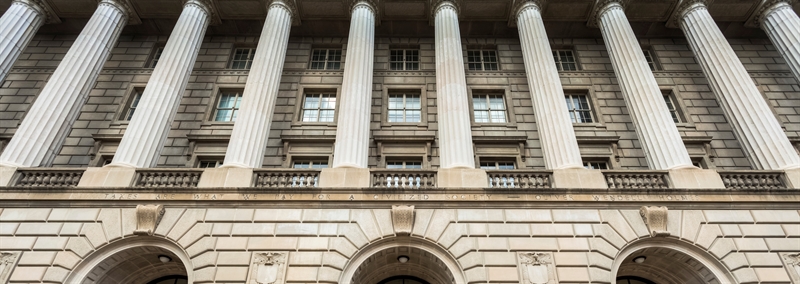Legislative Lowdown
CBO Report Finds Steep Cost of Extending TCJA Tax Provisions: On May 8, the Congressional Budget Office (CBO) released a report at the request of Senate Finance Committee Chairman Ron Wyden (D-OR) and Budget Committee Chairman Sheldon Whitehouse (D-RI) titled “Budgetary Outcomes Under Alternative Assumptions About Spending and Revenues.” The report found that extending the individual tax provisions of the Tax Cuts and Jobs Act (TCJA, Pub. L. 115-97) would increase the federal deficit by an estimated $3.8 trillion over the next 10 years, which includes an estimated $467 billion in interest payments. Furthermore, the CBO found that also extending the TCJA’s business tax provisions and gift and estate exemptions would increase the overall cost to $4.6 trillion. These added amounts are comprised of:
|
|
Increase in primary deficit
|
Deficit increase + net interest outlays
|
|
Extending the gift and estate tax exemption
|
$167 billion
|
$189 billion
|
|
Permanently maintaining 100% bonus depreciation and retroactively restoring it at that level back to tax year 2023
|
$378 billion
|
$469 billion
|
|
Maintaining other alterations of TCJA tax provisions
|
$172 billion
|
$197 billion
|
The $4.6 trillion total estimated cost is a significant increase over CBO’s 2023 projections, which indicated a deficit increase of $3.5 trillion to extend all the TCJA expiring provisions.
In response to the report, the Senate Budget Committee majority issued a press release urging the expiration of multiple TCJA provisions, primarily those benefiting large corporations and wealthy Americans. Similarly, Finance Committee Chairman Wyden stated that the report makes light of the “timing gimmicks” that Republicans included in the TCJA to justify its passage, and that the 2025 expiration of these provisions “threatens the middle class with an automatic tax hike if they don’t get what they want.” Chairman Whitehouse said that the expiration of certain TCJA provisions presents a chance “to undo the damage, fix our corrupted tax code, and have big corporations and the ultra-wealthy begin to pay their fair share.” Republicans quickly responded to the report by arguing that the TCJA tax provisions spurred economic growth that justifies its initial cost as well as an extension, and argued that the CBO issued a flawed report. House Ways and Means Committee Chairman Jason Smith (R-MO) and House Budget Committee Chairman Jodey Arrington (R-TX) issued a joint statement, asserting that because the report did not include policymaker input, “the studies and analyses are less helpful in the decision-making process and give the appearance of policies being cherry picked for analysis.” They also highlighted the TCJA’s accomplishments after its implementation, including increases in wages and real median household income, and significant declines in unemployment and poverty levels.
Some House Republicans Purportedly Open to Raising Corporate Tax Rate: At a business industry event on May 8, House Ways and Means Committee Chairman Jason Smith (R-MO) noted that some prominent Republicans have signaled an openness to raising the corporate tax rate, suggesting a potential area for bipartisan consensus in the broader conversation on tax policy in 2025. Republican interest in raising the corporate tax rate may stem from the federal debt and budget projections as well as a political reaction to social policies advanced by some large corporations. Were consensus to solidify on a corporate rate increase, it would likely serve as a key revenue raiser to advance expiring provisions of the Tax Cuts and Jobs Act (TCJA). While clarifying that he was not suggesting an increase in the corporate rate, Chairman Smith remarked that it will be “a huge task to try to pay for $4 trillion worth of taxes.” Ways and Means member Kevin Hern (R-OK), who also chairs the Republican Study Committee, indicated that the projected budgetary situation necessitates full review of the TCJA’s expiring provisions as well as potential revenue-raising options. Chairman Smith also indicated that there will be internal GOP discussion on the TCJA-imposed state-and-local-tax (SALT) deduction cap, due to criticisms by Republican House members representing districts in high-tax states like New York and California.

At a Glance
FAA Reauthorization Bill to Pass Without Extraneous Tax Provisions: On May 9, the Senate passed the Federal Aviation Administration (FAA) reauthorization bill with minor modifications from the previously passed House version. The House is expected to vote to pass the bill this week. Major FAA excise tax provisions will be extended with no major substantive changes from current law, and no significant tax legislation, namely the Wyden-Smith package of TCJA tax extensions and child-tax credit modifications, was attached.
Treasury Department, IRS Issue Regulations on Foreign Trust Reporting Rules: On May 7, the Treasury Department and Internal Revenue Service (IRS) issued proposed regulations on information reporting on foreign trust and gift transactions and foreign trust loans. The proposed regulations loosen requirements imposed by earlier guidance on this issue, and provide that a taxpayer may be exempt from filing Forms 3520 or 3520-A for tax-favored foreign retirement accounts if they meet a value threshold of $600,000 or an increased annual contribution limit of $75,000. The proposed regulations are open for public comment through July 8, and a hearing is scheduled for Aug. 21.
Republican House Members Introduce IP Repatriation Bill: On May 7, Reps. Darin LaHood (R-IL) and Drew Ferguson (R-GA) introduced the Bringing Back American Jobs Through Intellectual Property Repatriation Act (H.R. 8274), which is intended to incentivize U.S. businesses to return intellectual property (IP) developed offshore without incurring extra U.S. taxes. In a press release, Rep. LaHood said that the bill would “ensure that we remain the world’s leader in innovation, protect good American jobs, and strengthen our supply chains from growing global challenges.”
Ways and Means Committee Chair Introduces Taxpayer Information Protection Bill: On May 8, House Ways and Means Committee Chair Jason Smith (R-MO) introduced the Taxpayer Data Protection Act (H.R. 8292), which increases the maximum criminal penalty for the unauthorized disclosure of sensitive tax information to $250,000 or 10 years in prison. Chair Smith introduced this bill in response to the prosecution of Charles Littlejohn, a former Internal Revenue Service (IRS) contractor who was sentenced to five years in prison for leaking tax return information about wealthy filers, including former President Donald Trump, to ProPublica and The New York Times in 2021. In a press release, Chair Smith said the bill “takes vital steps to protect the integrity of the American tax system and ensures stark penalties if this happens again.”
House Republican Introduces Bill Taxing Large University Endowments: On May 8, Rep. Max Miller (R-OH) introduced the American Workforce Act (H.R. 8316). The bill would provide high school graduates with a $9,000 workforce training voucher paid for in part by taxing private college endowments. Specifically, the payfor would require secular institutions with endowments over $2.5 billion and an endowment-per-student of over $500,000 to pay a 1% excise tax on the fair market value of their endowment. This would be in addition to the 1.4% endowment excise tax currently levied on certain colleges and universities. In a press release, Rep. Miller said he created the bill due to his belief “that the government’s hefty investment in higher education hasn’t really set up our next generation for success.” Companion legislation (S. 4287) was concurrently introduced in the Senate by Sen. Tom Cotton (R-AR).

Brownstein Bookshelf
On May 7, the Tax Foundation released a paper titled “Options for Navigating the 2025 Tax Cuts and Jobs Act Expirations,” in which it argues for the extension of Tax Cuts and Jobs Act policies that promote the most economic growth through two proposals. The first would retain full immediate expensing of machinery and equipment investments, among other cost recovery measures, while letting the 20% Section 199A passthrough deduction expire and eliminating all itemized deductions. The second proposal adds measures to lower income tax rates and reintroduces a fully refundable child tax credit.
Hearings and Events
House Ways and Means Committee
On May 15, the House Ways and Means Committee will hold a markup of several bills, including H.R. 8292, the Taxpayer Data Protection Act.
Senate Finance Committee
The Senate Finance Committee has no tax hearings scheduled for this week.